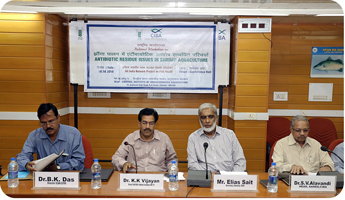Chennai, 18 August 2016.
 While the current Indian shrimp aquaculture sector has achieved spectacular growth in recent years ever since the introduction of the Pacific white shrimp Penaeus vannamei, the issue of antibiotic residue and related rejection of export consignments prevails. The Central Institute of Brackishwater and Aquaculture (CIBA) along with its national network partners in fish health have taken proactive initiatives to address this extremely important issue. In an effort to create awareness and also, a National Workshop was organized at CIBA on 18 August 2016. Dr Basanta Kumar Das (Director, CIFRI) chief guest, inaugurated a National Workshop to sensitize the farmers and stakeholders at CIBA; and highlighted the important role of research organizations in handling this issue. Dr Das stressed that the withdrawal period of antibiotics should be known before using the same and advocated the use of alternate strategies such as vaccines to minimise the usages of antibiotics. The Director, CIFRI also invited all the players in the shrimp farming and exporting sectors to take necessary steps and set a global standard for Indian products to prevent the rejection of shrimp consignments.
While the current Indian shrimp aquaculture sector has achieved spectacular growth in recent years ever since the introduction of the Pacific white shrimp Penaeus vannamei, the issue of antibiotic residue and related rejection of export consignments prevails. The Central Institute of Brackishwater and Aquaculture (CIBA) along with its national network partners in fish health have taken proactive initiatives to address this extremely important issue. In an effort to create awareness and also, a National Workshop was organized at CIBA on 18 August 2016. Dr Basanta Kumar Das (Director, CIFRI) chief guest, inaugurated a National Workshop to sensitize the farmers and stakeholders at CIBA; and highlighted the important role of research organizations in handling this issue. Dr Das stressed that the withdrawal period of antibiotics should be known before using the same and advocated the use of alternate strategies such as vaccines to minimise the usages of antibiotics. The Director, CIFRI also invited all the players in the shrimp farming and exporting sectors to take necessary steps and set a global standard for Indian products to prevent the rejection of shrimp consignments.
Dr K. K. Vijayan (Director, CIBA) deliberated Presidential address and briefed about the world class research facilities available at CIBA and other partnering ICAR institutes, such as CIFT, Kochi and invited the stakeholders to take full advantage of these national facilities. Dr Vijayan also mentioned about the three important national programmes that are in vogue at CIBA and the MoU with SEAI to deal with the problem of antibiotics.
MrV. Balasubramanian (President of Prawn Farmers Federation Association) made a presentation on stakeholder’s perception and ensured the co-operation and participation in solving the antibiotic issues. This was followed by a deliberation involving participants from different sectors. It was unanimously felt that a timely initiative has been taken and this should be a platform for preparing the relevant steps for addressing the antibiotic residue issue in shrimp aquaculture sector. It was also resolved that all the stakeholders will cooperate and work together along with the institutions and the government on a proactive mode to address this important national issue of antibiotic residue in shrimp farming sector.
The Secretary General, Seafood Exporters Association of India (SEAI), Mr Elias Sait, advised to first address the issue as to why antibiotic residue is becoming a problem; and pointed out the responsibility and important role of SEAI while dealing at all levels in shrimp farming.Mr Sait stressed highlighted the significance of the partnership between CIBA and SEAI and the MoU in place to deal with antibiotic residue issue. Quoting a letter from USFDA, Mr Sait indicated the severity of the problem and its cascading effect for all in the value chain, from hatchery to farmer and straight up to the exporter. Mr Sait also accentuated the need for various stakeholders to join hands and work together to find a lasting solution as early as possible.
The other deliberations were on the need for a multipronged approach targeting various levels of shrimp production from hatchery to processing; the problem of antibiotic usage in aquaculture due to the lack of awareness among farmers; emphasised the need to explore the scientific basis behind the use and misuse of antibiotics and evolve a national plan to address this problem;
The programme received overwhelming response from representatives of different stakeholders viz., farmers, officials from NFDB, PFFI, SEAI & SAP, hatchery operators, consultants and private entrepreneurs.
(Source: ICAR- CIBA, Chennai)







फेसबुक पर लाइक करें
यूट्यूब पर सदस्यता लें
X पर फॉलो करना X
इंस्टाग्राम पर लाइक करें